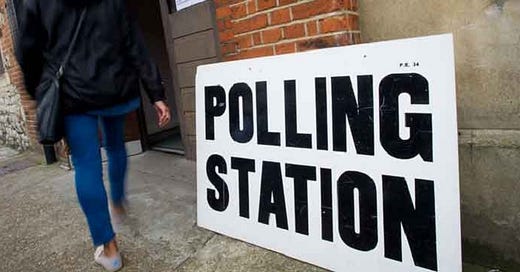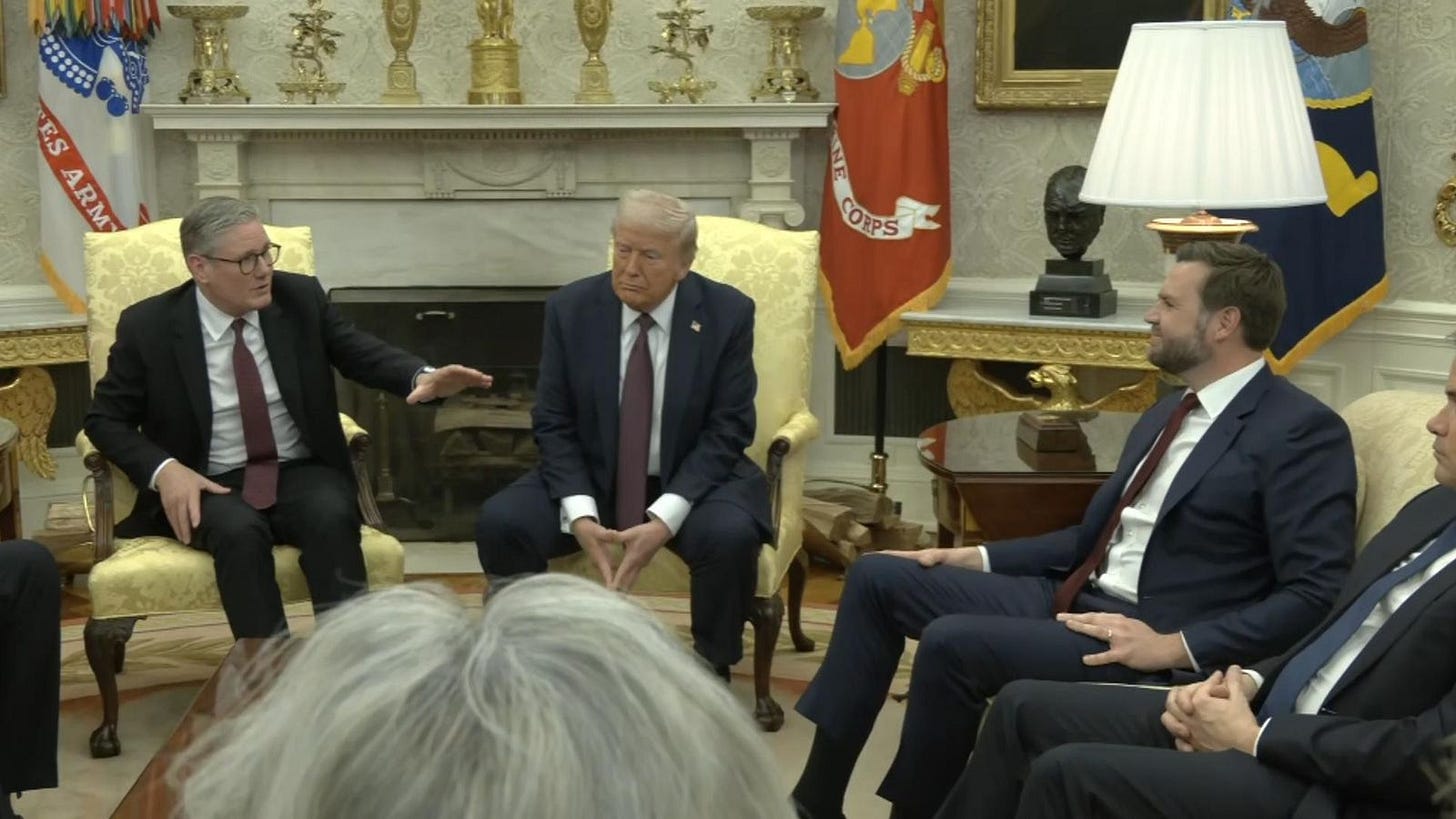Potemkin Democracy: The Great British Illusion
We still vote. We still pretend that Parliament matters. But behind the curtain of this ritualised theatre, Britain is no longer a functioning democracy in any meaningful way sense.
We are now governed by a Potemkin Democracy; a hollowed-out imitation of rule by the people, erected to maintain the appearance of consent while real power has shifted elsewhere.
The term “Potemkin Democracy” was coined by the critical thinker, John Brady, and it perfectly captures the contemporary British condition. Just as Grigory Potemkin supposedly erected false villages to impress Catherine the Great, so too has our political class built a facade of democratic legitimacy behind which a new form of governance operates—unaccountable, centralised, and immune to public scrutiny.
Prince Grigory Potemkin
What remains of British democracy is largely ornamental. The reality is rule by bureaucratic fiat, judicial activism, international treaty obligation, NGO influence, and ministerial decree. The most significant decisions affecting our lives are not made in the Commons chamber, but in corporate boardrooms, in civil service policy cells, in supranational meetings we never voted to join. We aren’t happy about this, despite attempts to justify the Brexit vote as being a racist backlash of little Englunders or the foolish act of a population lied to by charlatans, the exit polls from that referendum clearly state that the main reason why people voted Brexit was to return sovereignty to the UK, to ensure that those making the laws above us were directly democratically accountable to the electorate. If there was an naivety here it was in how deep the rot in our democracy actually was and is. Leaving the EU was only a fraction of the problem. Brexit has, if anything steeled some voters into the realisation that our democracy is as phony as any of Prince Grigory’s villages.
This did not happen overnight. The late Lord Hailsham warned of it decades ago. In his famous warning against “elective dictatorship,” he noted that Britain’s unwritten constitution offered no real protection against the steady erosion of liberty by executive power. Ministerial decree, he said, would become the dominant threat to freedom in the modern age. He was right. The last thirty years have seen the very form of parliamentary democracy weaponised to dissolve its substance.
Returning to Brexit, we thought it would restore sovereignty to Westminster. But what use is sovereignty if it is wielded by a Parliament that no longer listens to the people? The reality is that the political class spent years trying to overturn the democratic vote itself. The civil service, the judiciary, even the Speaker of the House of Commons colluded, overtly or passively, in the great sabotage. “Take Back Control” was not a project of liberation. It was a redirection of power from one unaccountable elite to another.
Consider the fate of Liz Truss. Selected as Prime Minister by the vote of Conservative Party Members, she was swept aside not by voters but by bond markets, mandarins, and media outrage. It was not her policies that were deemed illegitimate, but her very presumption to act.
In this new order, radical change is forbidden because it threatens the stasis that sustains the unelected managerial class. Truss’s removal sent a clear message to future leaders: you are permitted to decorate the cage, not unlock it.
Perhaps this explains the continued ministerial employment of Ed Miliband as Environment Secretary? 30 years ago no Prime Minister would have indulged a minister of such political liability. Yet he still retains his job, gaffe after gaffe. Why? Who is protecting him? Net Zero, his brief, is the most radical economic and social transformation ever proposed in peacetime. It affects energy, transport, housing, industry, and food. Yet it has never been properly debated, costed, or voted on. It is implemented by statutory instruments, pushed by global NGOs, rubber-stamped by civil servants, and enforced by local councils. The electorate is treated not as sovereign, but as an obstacle.
The Covid Inquiry provides further evidence. Not of ministerial failure, as the press would have us believe, but of something more chilling. The machinery of the state now functions independently of democratic oversight. Decisions of monumental consequence were made behind closed doors, based on modelling rather than evidence, and enforced with the zeal of a new priesthood. Parliament was sidelined. Dissenting voices were silenced. Constitutional norms were suspended. All under the guise of scientific neutrality. No apologies. No admissions. Just the cold, bureaucratic efficiency of a system that no longer answers to those it rules.
In Scotland, the illusion becomes grotesque. The Gender Recognition Reform Bill—allowing self-declared gender change without medical consultation—was passed by a Scottish Parliament more interested in ideological posturing than public safety. The UK government attempted to block it. The result? An unelected court decided which government had the right to speak for women, and neither of them represented the electorate. Simultaneously, the Hate Crime and Public Order Act (Scotland) 2021 has criminalised ordinary conversation. Jokes, dinner table comments, even thoughts and prayers expressed in one’s own home are now potentially prosecutable. This is not democracy. This is tyranny in pastel colours.
We saw the mask slip further on the world stage. In February 2025, Keir Starmer—by then Prime Minister, sat in the Oval Office and was publicly corrected by U.S. Vice President JD Vance over his government’s attitude to freedom of speech. Vance, representing a country with a written constitution and a cultural memory of tyranny, warned Starmer that the UK’s creeping censorship laws were not just un-American, but anti-democratic. The conversation, while civil, was chilling. Here was the elected leader of Britain, unable to defend his own country’s record on speech without hiding behind vague assurances about safety and inclusion, while a foreign statesman reminded him of what liberty actually means.
That such a rebuke had to come from Washington, and not Westminster, says everything. In Britain, speech is now a privilege granted by the state, not a right secured by the people. Laws like the Online Safety Act make Big Tech the enforcement arm of political orthodoxy. If you deviate, your bank account, social media profile, or professional accreditation may simply vanish. And Starmer, once Director of Public Prosecutions, now Prime Minister, sees no contradiction in this. That should terrify us.
British Prime Minister Sir Keir Starmer, summoned to the increasingly hot seat in the Oval Office, attempts to convince a cynical JD Vance that the UK has Freedom of Speech.
Meanwhile, two-tier justice flourishes. Climate protesters block roads, vandalise property, and disrupt lives and are met with understanding, even admiration, by the courts and police. Criminals are pampered with light sentences, this week a man who decided to use the A1 in Newcastle as a race track provoked a police chase that ended in hundreds of thousands in damaged police cars and several injuries. His punishment? 14 months in a Young Offender’s Institution. But speak out against illegal immigration, misgender someone by accident, or object to drag shows for children, and you may well find yourself arrested, de-banked, or publicly smeared. The law is no longer blind. It is ideological. Even if the charges won’t stick, expect the State to implement the old Stasi strategy of ‘decaying’ your life, they had a word for it in the DDR: Zersetsung - literally ‘decay’, the point being that if the charges won’t stick you can destroy a dissidents life, employment, family, career, financial wellbeing though the mere process. If you find yourself on the end of a spurious hate crime complaint, expect plod to descend on you mob handed (despite constanty moaning about lack of resources). Along with feeling your collar and ransacking your home for copies of Douglas Murray books and The Spectator, they will confiscate your electronic items ALL of them, even the kid’s tablets. Don’t expect them back any time soon either. As a self employed writer this would be devastating for my business, income and very essential privacy. Oh, and don’t be surprised if your personal details are then doxxed to those who may actually wish to cause you harm, as happened to the YouTube Journalist Mahyar Tousi recently. After being arrested for covering the weekly Anti Israel marches ‘for his own safety’ apparently, a contractor working for the Met released his personal details to the very individuals who they were apparently protecting him from. You couldn’t make this up. Why? Well apparently this time it was a ‘rogue’ operator. Perhaps if the Met Police spent more time policing the recruitment of their staff rather than harassing journalists and members of the public, this wouldn’t have happened. André Walker has accused the Mayor’s office of brushing this under the table. Oh, and don’t expect to see any management heads rolling for this balls up, in the UK these days our nomenklatura never, ever suffer any consequences. The casual attitude to this potentially lethal error speaks volumes about a culture in those who hold power, that the end justifies the means, that the rights of the citizen can be over ridden ‘for the greater good’. Sit down. Shut up. Don;t ask questions. Vote as we indicate and pay your taxes.
What we are seeing is not a failure of democracy, but its replacement. The electorate has become a nuisance, an afterthought, a relic. Consent is simulated, not sought. The rituals remain: the voting booths, the manifestos, the Parliament TV feed; but they are like those helter-skelters or raves you see the Church of England holding in one of our great cathedrals. They evoke a lost faith.
And the people know. They may not articulate it in constitutional terms, but they feel the truth in their bones. That they no longer matter. That nothing changes. That the game is rigged. That the actors on stage are merely reciting lines written by unseen hands. This is why trust in institutions has collapsed. Why turnout declines. Why the public disengages or turns to figures outside the system. It is not apathy. It is wisdom. And the longer this charade continues, the more brittle it becomes. A democracy can survive incompetence. It can survive disagreement. But it cannot survive contempt. And contempt is now the default setting of the governing class.
If Britain is to be rescued from this slow-motion dissolution, it will not come from within the system. It will come from without. From people prepared to tear down the facade and begin again. From those willing to speak plainly, to resist politely but firmly, and to reclaim the birthright of free citizens in a free country.
Until then, we are not governed. We are managed. And the Potemkin Democracy will stand, gaudy and hollow, until a storm comes and rips the canvas from the frame.







This is a grim but precise and excellent analysis of our contemporary system of 'government', and I agree with every point you make. I'd just add this to the Truss 'theatre': Ms Truss was a product of her Whitehall handlers - surely we know by now that all our ministers in this and the preceding governments have their thoughts, their speeches, their agendas, created by the mandarins in their offices and departments. Once in No 10, she stopped doing as expected, as she was told - and had to go.
Indeed, more and more of us are disengaging -not just from any participation in the political arena but also from perusing 'news' as presented in the establishment MSM, not even when simply trying to raise one's blood pressure.
My Lin won a 5-day civil case against WM Police in 1999 (before a jury) for 'wrongful arrest, false imprisonment and malicious prosecution', being awarded costs and damages. Though very no-nonsense and contemptuous of being 'a victim', L remained unhappy about the experience. While chatting to her GP (during a routine appointment) he, a wise doctor, said "Look, Lin, you're suffering a bereavement" "How do you mean?" "All your life you've taken it for granted that the system - police and courts - can be trusted. You had an encounter in which a police officer told a lie, and that lie was supported by his colleagues. You were arrested, charged and held in custody for something you didn't do. The effect of that experience was that you've lost something that was quite basic to your understanding of the world. and your trust in 'the system'" What a superlative example of non-medical care from a doctor! To our relief, and to the credit of our barrister, the judge and jury, L's civil action - proceedings that went on for 3 years - put things judicially right, but the sense of a 'bereavement' endures. Your piece is so spot on. It grieves us 'in our bones'.